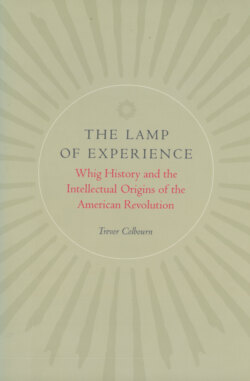The Lamp of Experience

Реклама. ООО «ЛитРес», ИНН: 7719571260.
Оглавление
Trevor Colbourn. The Lamp of Experience
Отрывок из книги
The Lamp of Experience
Preface to the Liberty Fund Edition: 1943 and All That
.....
Exposure to an academic library meant an early exposure to English history. Each of the nine colleges in colonial America had its library. Harvard College published library catalogues in which the number of secular historical volumes steadily increased as the eighteenth century advanced. The initial Harvard catalogue, issued in 1723, included such standard seventeenth-century historical sources as John Rushworth’s Historical Collections, and subsequent lists added Gilbert Burnet’s popular History of His Own Time and equally important whig works by Paul Rapin-Thoyras and James Tyrrell. Like many college collections, Harvard’s suffered from fire, but it was speedily restocked with the help of the strenuous English whig Thomas Hollis. A student at Harvard on the eve of the Revolution found numerous whig authors represented: Thomas Gordon, author of the Independent Whig and Cato’s Letters; Robert Molesworth, whose Account of Denmark revealed the nature of absolutism and portrayed liberty as “the greatest natural blessing mankind is capable of enjoying”; Edmund Ludlow (the regicide), whose Memoirs were an arsenal of arguments for republicanism and against standing armies; William Molyneux (friend to Locke), author of The Case of Ireland, which not only argued that Ireland was independent of the English Parliament but also elaborated a theory of natural inherent rights of men; and Catherine Macaulay, the anti-Stuart historian.21
Harvard’s collections were larger than those of any other colonial college, but not larger in the proportionate share given to history. Yale’s first library catalogue, 1743, listed many of the same history books; but where history had been at best a minor but interesting part of Harvard’s holdings, in Yale’s library history comprised the largest single category and continued to do so through successive catalogues.22 The College of New Jersey’s library was small, but again history was handsomely represented; and in 1755 when Governor Jonathan Belcher donated his library to the College, historical works of Burnet, Rapin, Ludlow, and Sidney and both Gordon’s Tacitus and Cato’s Letters were added. When fire caused destruction at Princeton, President John Witherspoon donated his personal collection including replacements for the burned volumes of Burnet, Vertot (the historian of revolutions), and Potter (Antiquities of Greece), and adding two editions of Tacitus for good measure.23 Rhode Island College, founded in 1764, issued a catalogue in 1782 which listed the familiar works of Mrs. Macaulay, Bishop Burnet, William Robertson (History of Scotland), and Lord Clarendon (History of the Rebellion). Fire destroyed the library of the College of William and Mary in 1705 and again during the Revolution; no catalogues were published by either King’s College in New York or the College of Philadelphia.24
.....